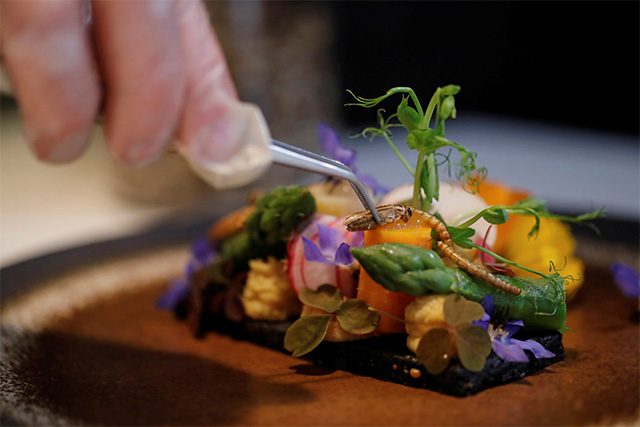
PARIS — Laurent Veyet’s tasting menu is not for the faint-hearted, but may point to the future of feeding a booming world population – there is a prawn salad with yellow mealworm, crunchy insects on a bed of vegetables and chocolate-coated grasshoppers.
As sun bathed the outdoor restaurant terraces in Paris, Veyet’s ornate dishes were winning approving nods and murmurs of satisfaction from his adventurous clientele.
“It’s the ideal dish for first-timers,” the Parisian chef said, preparing a serving of pasta made with mealworm flour, sweet potato and sauteed insect larvae. “There are some really interesting flavors. Not many people could say they don’t like that.”
The European Food Safety Agency (EFSA) in January deemed the mealworm fit for human consumption and in May approved its sale on the market. The agency has fielded more than a dozen other applications for insect-based food products, including crickets and locusts.
Mealworm, and insects more generally, could offer a sustainable and low carbon-emission food source for the future.
Dining with his two daughters, Soheil Ayari gave his endorsement: “I feel like I am in a traditional restaurant except the concept behind what I’m eating is different. And honestly, the tastes are very similar (to regular food).”
Ayari’s young daughter was equally positive: “It’s environmentally friendly and what’s more, it’s good.”
Veyet grows his mealworm on site, feeding them porridge oats and vegetables. While the mealworm may look like an unappetizing maggot, it is in fact the larvae of the darkling beetle, rich in protein, fat and fibre.
A versatile ingredient, the mealworm can be used whole in curries or salads, or ground to make flour for pasta, biscuits or bread.
“Insects are nutritious,” said Stefan De Keersmaecker, a health and food safety spokesman at the European Commission. “They can really help us switch to a more healthy and sustainable diet and food system.”
For Veyet, the challenge is two-fold: winning over public opinion and learning how to match the insects’ taste with other foods.
“You have to find the right flavors, the right accompaniments. All that is fascinating, any chef will tell you the same,” he said.
—Editing by Richard Lough and Janet Lawrence









